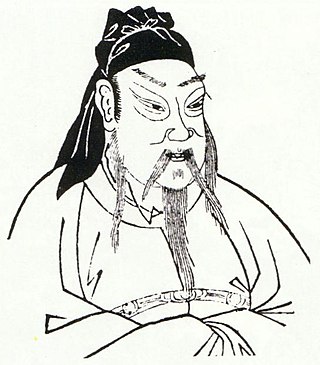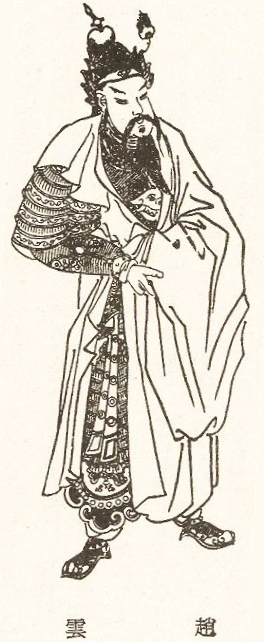
Guan Yu, courtesy name Yunchang, was a Chinese military general serving under the warlord Liu Bei during the late Eastern Han dynasty of China. Along with Zhang Fei, he shared a brotherly relationship with Liu Bei and accompanied him on most of his early exploits. Guan Yu played a significant role in the events leading up to the end of the Han dynasty and the establishment of Liu Bei's state of Shu Han during the Three Kingdoms period. While he is remembered for his loyalty towards Liu Bei, he is also known for repaying Cao Cao's kindness by slaying Yan Liang, a general under Cao Cao's rival Yuan Shao, at the Battle of Boma. After Liu Bei gained control of Yi Province in 214, Guan Yu remained in Jing Province to govern and defend the area for about seven years. In 219, while he was away fighting Cao Cao's forces at the Battle of Fancheng, Liu Bei's ally Sun Quan broke the Sun–Liu alliance and sent his general Lü Meng to conquer Liu Bei's territories in Jing Province. By the time Guan Yu found out about the loss of Jing Province after his defeat at Fancheng, it was too late. He was subsequently captured in an ambush by Sun Quan's forces and executed.

Zhao Yun, courtesy name Zilong (子龍), was a military general who lived during the late Eastern Han dynasty and early Three Kingdoms period of China. Originally a subordinate of the northern warlord Gongsun Zan, Zhao Yun later came to serve another warlord, Liu Bei, and had since accompanied him on most of his military exploits, from the Battle of Changban (208) to the Hanzhong Campaign (217–219). He continued serving in the state of Shu Han – founded by Liu Bei in 221 – in the Three Kingdoms period and participated in the first of the Northern Expeditions until his death in 229. While many facts about Zhao Yun's life remain unclear due to limited information in historical sources, some aspects and activities in his life have been dramatised or exaggerated in folklore and fiction. In the 14th-century historical novel Romance of the Three Kingdoms, he was lauded as a member of the Five Tiger Generals under Liu Bei.

Jiang Wei, courtesy name Boyue, was a Chinese military general and politician of the state of Shu Han during the Three Kingdoms period of China. Born in Ji County, Jiang Wei started his career as a military officer in his native Tianshui Commandery, which was a territory of Wei. In 228, when Wei's rival state Shu launched an invasion led by Zhuge Liang, Jiang Wei was distrusted by Ma Zun, then administrator of Tianshui Commandery. As such, Jiang Wei had to defect to Shu. Zhuge Liang, the Imperial Chancellor and regent of Shu, highly regarded Jiang Wei and appointed him as a general in Shu. After Zhuge Liang's death in 234, Jiang Wei continued serving as a military commander during the regencies Jiang Wan and Fei Yi, eventually rising to the highest military rank of General-In-Chief (大將軍) after Fei Yi's death in 253. Between 240 and 262, he continued Zhuge Liang's legacy of waging war against Wei by leading another 11 military campaigns. However, Jiang Wei's campaigns were relatively constrained in terms of both scale and duration due to Shu's limited resources and inadequate food supplies, as well as internal political faultlines. In 263, when Wei launched a massive invasion of Shu, Jiang Wei led Shu forces to resist the invaders at Tazhong, Yinping and Jiange, himself defending Jiange which was under Zhong Hui's attack. While Jiang Wei managed to temporarily stall Wei's main force led by Zhong Hui, Deng Ai, another military commander of Wei, took a shortcut via Yinping and showed up at Chengdu unexpectedly. Liu Shan surrendered to Deng Ai without putting up resistance and ordered Jiang Wei to surrender to the Wei general Zhong Hui; this event marked the end of Shu's existence. In the following year, Jiang Wei instigated Zhong Hui to launch a rebellion in Chengdu against the Wei regent Sima Zhao and hoped to use the opportunity to gain military power and restore Shu. However, some of Zhong Hui's officers were unwilling to participate in the rebellion and started a mutiny, killing Jiang Wei and Zhong Hui.

Zhang Fei, courtesy name Yide, was a Chinese military general and politician serving under the warlord Liu Bei in the late Eastern Han dynasty and early Three Kingdoms period of China. Zhang Fei and Guan Yu, who were among the earliest to join Liu Bei, shared a brotherly relationship with their lord and accompanied him on most of his early exploits. Zhang Fei fought in various battles on Liu Bei's side, including the Red Cliffs campaign (208–209), takeover of Yi Province (212–214), and Hanzhong Campaign (217–218). He was assassinated by his subordinates in 221 after serving for only a few months in the state of Shu Han, which was founded by Liu Bei earlier that year.

Deng Ai, courtesy name Shizai, was a Chinese military general and politician of the state of Wei during the Three Kingdoms period of China. He is best known for his pivotal role in the Wei conquest of its rival state, Shu, in 263. He was described as a very loyal subject who made great contributions to Wei, but was also noted for his arrogance and audacity, which led to his downfall and death.

Chen Shou, courtesy name Chengzuo (承祚), was a Chinese historian, politician, and writer who lived during the Three Kingdoms period and Jin dynasty of China. Chen Shou is best known for his most celebrated work, the Records of the Three Kingdoms (Sanguozhi), which records the history of the late Eastern Han dynasty and the Three Kingdoms period. Chen Shou wrote the Sanguozhi primarily in the form of biographies of notable persons of those eras. Today, Chen's Records of the Three Kingdoms is part of the Twenty-Four Histories canon of Chinese history.

Zhong Hui, courtesy name Shiji, was a Chinese calligrapher, essayist, military general, and politician of the state of Cao Wei during the Three Kingdoms period of China. He was the younger son of Zhang Changpu with Zhong Yao, who served as the Grand Tutor in the Wei imperial court. He was already known for being insightful, intelligent and knowledgeable since he was young. Zhong Hui rose to prominence in the 250s when he became a close aide to Sima Zhao, the regent and de facto ruler of Wei. He advised Sima Zhao on how to deal with the Third Rebellion in Shouchun from 257 to 258 and was highly regarded by the latter. With Sima Zhao's help, Zhong Hui steadily moved up the ranks and became one of the key figures in the Wei government.

Zhuge Zhan, courtesy name Siyuan, was a Chinese military general and politician of the state of Shu Han during the Three Kingdoms period of China. He was a son of Zhuge Liang, the first Imperial Chancellor of Shu.

Cao Zhen, courtesy name Zidan, was a military general of the state of Cao Wei during the Three Kingdoms period of China. He was an adopted son of Cao Cao, a warlord who rose to power in the late Eastern Han dynasty and laid the foundation for Wei. After Cao Cao's death and the end of the Eastern Han dynasty, Cao Zhen served under Cao Pi and Cao Rui, the first two emperors of Wei. He is best known for leading a successful defence of Wei from the first two of a series of invasions by Wei's rival state, Shu Han, between 228 and 229.
Xiahou Mao, courtesy name Zilin, was a military general and marquis of the state of Cao Wei during the Three Kingdoms period of China. He was the second son of Xiahou Dun, a general who served under the warlord Cao Cao, while Xiahou Mao was a close friend of the founding Emperor Cao Pi. Xiahou Mao married Princess Qinghe, one of Cao Cao's daughters, though the marriage would be an unhappy one and he once faced accusation of treason from his own family.
Xiahou Shang, courtesy name Boren, was a Chinese military general and politician of the state of Cao Wei during the Three Kingdoms period of China. He was a distant younger relative of Xiahou Yuan and a close friend of Cao Pi, the first emperor of the Cao Wei state.
Cao Song, courtesy name Jugao, was an official who lived during the Eastern Han dynasty of China. He was the foster son of the eunuch Cao Teng and the father of the warlord Cao Cao, who rose to prominence in the final years of Eastern Han and laid the foundation of the state of Cao Wei in the Three Kingdoms period. Cao Song was posthumously honoured as "Emperor Tai" by his grandson Cao Pi in 220 when the latter ended the Han dynasty and founded the Cao Wei regime.
Fei Shi, courtesy name Gongju, was an official of the state of Shu Han during the Three Kingdoms period of China.
Huan Jie, courtesy name Boxu, was a Chinese official who lived during the late Eastern Han dynasty and served under the warlord Cao Cao. After the fall of the Eastern Han dynasty, he briefly served in the state of Cao Wei during the Three Kingdoms period.
Liu Bei's takeover of Yi Province was a military campaign by the warlord Liu Bei in taking control of Yi Province from the provincial governor, Liu Zhang. The campaign took place between the years 211 and 214 in the late Eastern Han dynasty; although the conflict between Liu Bei and Liu Zhang started in January or February 213 when the latter discovered the former secret communications and subsequently executed Zhang Song. It concluded with victory for Liu Bei and his successful takeover of the province from Liu Zhang in July 214. Yi Province would serve as the foundation of the state of Shu Han during the Three Kingdoms period.

The Conquest of Shu by Wei was a military campaign launched by the dynastic state of Cao Wei against its rival Shu Han in late 263 during the Three Kingdoms period of China. The campaign culminated in the fall of Shu Han and the tripartite equilibrium maintained in China for over 40 years since the end of the Eastern Han dynasty in 220. The conquest laid the foundation for an eventual reunified China under the Western Jin dynasty in 280.
Deng Yang, courtesy name Xuanmao, was an official of the state of Cao Wei in the Three Kingdoms period of China.
Meng Guang, courtesy name Xiaoyu, was an official and scholar of the state of Shu Han in the Three Kingdoms period of China.
Yang Xi, courtesy name Wenran, was an official of the state of Shu Han during the Three Kingdoms period of China. He is best known for writing the Ji Han Fuchen Zan, a collection of praises of notable persons who served in the Shu Han state. Chen Shou, the third-century historian who wrote the Records of the Three Kingdoms (Sanguozhi), extensively quoted and annotated Yang Xi's collection.










